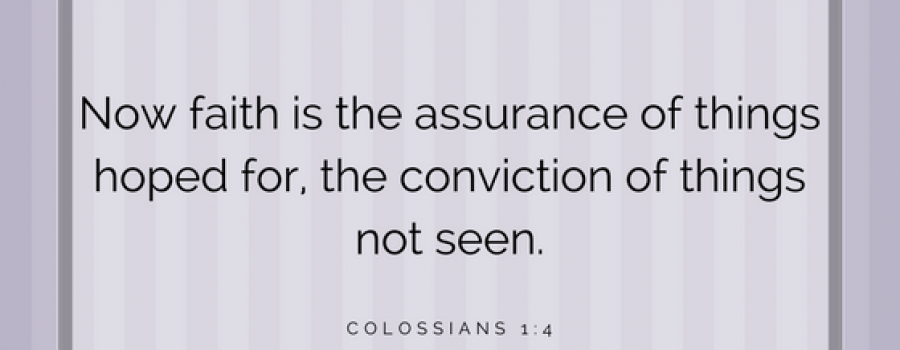What do we mean by faith? A sermon on Hebrews 11:1-3, 8-16.
Psalm 33:12-22
Happy is the nation whose God is the Lord, the people whom he has chosen as his heritage.
The Lord looks down from heaven; he sees all humankind.
From where he sits enthroned he watches all the inhabitants of the earth–
he who fashions the hearts of them all, and observes all their deeds.
A king is not saved by his great army; a warrior is not delivered by his great strength.
The war horse is a vain hope for victory, and by its great might it cannot save.
Truly the eye of the LORD is on those who fear him, on those who hope in his steadfast love,
to deliver their soul from death, and to keep them alive in famine.
Our soul waits for the LORD; he is our help and shield.
Our heart is glad in him, because we trust in his holy name.
Let your steadfast love, O LORD, be upon us, even as we hope in you.
Hebrews 11:1-3, 8-16
Now faith is the assurance of things hoped for, the conviction of things not seen. Indeed, by faith our ancestors received approval. By faith we understand that the worlds were prepared by the word of God, so that what is seen was made from things that are not visible. …
By faith Abraham obeyed when he was called to set out for a place that he was to receive as an inheritance; and he set out, not knowing where he was going. By faith he stayed for a time in the land he had been promised, as in a foreign land, living in tents, as did Isaac and Jacob, who were heirs with him of the same promise. For he looked forward to the city that has foundations, whose architect and builder is God. By faith he received power of procreation, even though he was too old–and Sarah herself was barren–because he considered him faithful who had promised. Therefore from one person, and this one as good as dead, descendants were born, “as many as the stars of heaven and as the innumerable grains of sand by the seashore.”
All of these died in faith without having received the promises, but from a distance they saw and greeted them. They confessed that they were strangers and foreigners on the earth, for people who speak in this way make it clear that they are seeking a homeland. If they had been thinking of the land that they had left behind, they would have had opportunity to return. But as it is, they desire a better country, that is, a heavenly one. Therefore God is not ashamed to be called their God; indeed, he has prepared a city for them.
***
A couple of months into my first year of seminary, a group of classmates and I decided to go camping.
This was already something of a stretch for me—I’ve always liked the idea of camping more than the reality. Give me indoor plumbing any day of the week.
I also didn’t know the group all that well. They weren’t exactly strangers, but after only a few months, we weren’t exactly besties, either. It was kind of a make-or-break weekend: when you go camping with people, you either come out friends, or you really, really don’t.
We got to the campsite, unloaded our cars, and about fifteen minutes later, my worst fears were realized: Ben wanted us to do trust falls.
See, Ben also knew that the group was mostly strangers, and he figured the best way to bring us closer together was that most classic of team building exercises. Up he popped onto a picnic table, turned around, and started to fall backwards before most of us even knew what was happening.
We caught him, fortunately. We also caught the next four or five brave souls who put their lives in our hands. As each person stepped up to the plate, I found myself more and more nervous.
I do not like trust falls. I do not like them, Sam I Am. And I especially don’t like doing them with people I do not know.
Now, I realize the whole point of trust falls is well, trust, and trust is based at some point on just letting go and believing someone will do something whether you have proof or not. But I am a firm believer in the idea that you should build trust with people in a way that doesn’t endanger life or limb, should you be mistaken.
I remember feeling more and more shaky as it became clear that I would have to take a turn. There were eleven people in our group, and I was the last. They caught ten people, I kept saying to myself. If they caught ten people, surely they’ll catch you.
This story doesn’t have a very dramatic ending, I’m afraid. I got up on the picnic table, went over backwards, and they caught me.
I bring this up to share that like many people, trust is a word that makes me a little nervous. It’s not that I don’t trust people—it’s that I’d prefer not to have to trust people, especially when my safety is on the line. And yet trust is exactly what our text today extols.
You might not have caught the word trust when I read from Hebrews earlier. Our NRSV translates the Greek word pistis as faith: faith is the assurance of things hoped for, the conviction of things not seen. But pistis also means trust; or rather, the two meanings are indistinguishable in the Greek—to have faith and to trust in are one and the same.
Now, I love the word faith. Love love love it. I think it’s one of the most beautiful words I know. I love to talk about faith, about being a person of faith, about communities of faith, about faithful action, faithful witness, faithful love. I will spout off about faith all day long.
But trust? Trust pulls me up short a little. Because there’s an element of danger in trust, the voice in the back of your head saying: you could always be wrong.
I’m still friends with some of the folks from that camping trip, and now, four years later, I’d trust them with my life. I saw them catch ten people and felt them catch me; we’ve helped each other through exams and heartache and job searches and deaths and moves. They have proven themselves to be trustworthy by their actions. Of course, I still don’t know that they will be there for me tomorrow. But I hope they will be, and I’m sure they will be, because they’ve always been there before.
Now trust is the assurance of things hoped for, the conviction of things not seen.
It is the same way with my faith in God. I trust God—trust God with my whole heart—not simply because I know I’m supposed to, but because I have seen God work wonders. I have seen people find peace. I have seen people forgive. I have seen people find purpose. I have seen the hungry fed, the homeless housed, the lonely loved, the grieving comforted. I’ve seen God’s track record, and it’s pretty darn good.
Of course, God’s track record reaches much further back than my own life. When the author of Hebrews wants to show how trustworthy God is, he draws on the stories of the Hebrew scriptures, the stories of men and women who heard God’s promises and believed in them, and whom God took care of. In essence, he reminds his readers of this fact: God has proved trustworthy in the past. God caught all these people. God will catch you when you fall, too.
I know as much as anyone that trust isn’t easy. Faith isn’t easy. For every flash of deep spiritual peace in my life, I spend countless days reminding myself of what God has done for me, for all of us, so that I can keep trusting even when I cannot see.
I think that is why I am so mind-bogglingly grateful for this table, because every time I come to the table, wherever I am, however well I am doing at trusting God, I am given two gifts: a reminder of God’s track record, and something I can see.
Communion is a sacrament, what the ancient theologian Augustine called “an outward and visible sign of an inward and invisible grace.” And in this case, one of the ways Jesus shows me grace is in giving me something to see, taste, touch; some sign of God’s love that I don’t just have to imagine. I often give thanks for Jesus’ genius, in making bread and wine, two of the most common substances in the world, reminders of God’s grace. “Do this in remembrance of me,” Jesus says, and so every time we come to the communion table we do exactly that, we remember that Jesus came to earth, lived, died, and rose again to show us what God’s love looks like on display. We remember that nothing stopped God from sharing life abundant with us—not even death. And in remembering, again and again and again, we learn to trust that nothing ever will.
God’s love is all around us, in our families, our neighbors, strangers we have yet to meet. The spirit winds invisibly through our lives, mending the broken places and giving us courage to meet new challenges. And yet it comes to rest here, in a loaf of bread and a cup of juice, so that we might remember, taste, see, and trust.
Amen.



1 Comment
Leave your reply.